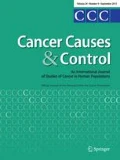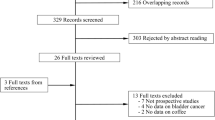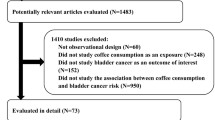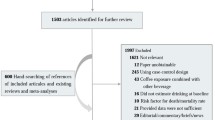Abstract
Purpose
Many epidemiological studies have been conducted to explore the association between coffee consumption and prostate cancer. However, the results remain inconsistent. We performed a large meta-analysis of relevant studies to derive a more precise estimation of this relationship.
Methods
Systematic searches of PubMed and several other databases up to June 2013 were retrieved. All epidemiologic studies regarding coffee consumption and prostate cancer risk were included, and odds ratios (ORs) with 95 % confidence intervals (CIs) were calculated to estimate the strength of the association.
Results
Twelve case–control studies involving 7,909 prostate cancer cases and 9,461 controls and nine cohort studies involving 455,123 subjects were included in our analysis. Compared with the lowest category, the unstratified highest category of coffee consumption showed a significance reduction in prostate cancer risk of a fixed-effects model (OR 0.91, CI 0.86–0.97). A borderline significant influence was also found when the stratified highest category (US ≥4, Europe ≥5) of coffee consumption was compared with the reference category (OR 0.96, CI 0.92–1.00), but no relationships were observed for the other two categories. In another analysis conducted by coffee consumption and prostate cancer stage and Gleason grade, our results showed a significant inverse association in all categories of prostate cancer except Gleason <7 grade in a fixed-effects model; the results remained the same, except for advanced prostate cancer, in a random-effects model.
Conclusions
Our meta-analysis suggests that high (e.g., highest ≥4 or 5 cups/day) coffee consumption may not only be associated with a reduced risk of overall prostate cancer, but also inversely associated with fatal and high-grade prostate cancer.



Similar content being viewed by others
References
Jemal A, Bray F, Center MM, Ferlay J, Ward E, Forman D (2011) Global cancer statistics. CA Cancer J Clin 61(2):69–90. doi:10.3322/caac.20107
Ferlay J, Shin HR, Bray F, Forman D, Mathers C, Parkin DM (2010) Estimates of worldwide burden of cancer in 2008: GLOBOCAN 2008. Int J Cancer 127(12):2893–2917. doi:10.1002/ijc.25516
Giovannucci E, Liu Y, Platz EA, Stampfer MJ, Willett WC (2007) Risk factors for prostate cancer incidence and progression in the health professionals follow-up study. Int J Cancer 121(7):1571–1578. doi:10.1002/ijc.22788
Svilaas A, Sakhi AK, Andersen LF, Svilaas T, Strom EC, Jacobs DR Jr, Ose L, Blomhoff R (2004) Intakes of antioxidants in coffee, wine, and vegetables are correlated with plasma carotenoids in humans. J Nutr 134(3):562–567
Higdon JV, Frei B (2006) Coffee and health: a review of recent human research. Crit Rev Food Sci Nutr 46(2):101–123. doi:10.1080/10408390500400009
Huber WW, Scharf G, Nagel G, Prustomersky S, Schulte-Hermann R, Kaina B (2003) Coffee and its chemopreventive components Kahweol and Cafestol increase the activity of O6-methylguanine-DNA methyltransferase in rat liver—comparison with phase II xenobiotic metabolism. Mutat Res 522(1–2):57–68
Cavin C, Marin-Kuan M, Langouet S, Bezencon C, Guignard G, Verguet C, Piguet D, Holzhauser D, Cornaz R, Schilter B (2008) Induction of Nrf2-mediated cellular defenses and alteration of phase I activities as mechanisms of chemoprotective effects of coffee in the liver. Food Chem Toxicol 46(4):1239–1248. doi:10.1016/j.fct.2007.09.099
Takahashi E (1964) Coffee consumption and mortality for prostate cancer. Tohoku J Exp Med 82:218–223
Park CH, Myung SK, Kim TY, Seo HG, Jeon YJ, Kim Y (2010) Coffee consumption and risk of prostate cancer: a meta-analysis of epidemiological studies. BJU Int 106(6):762–769. doi:10.1111/j.1464-410X.2010.09493.x
Yu X, Bao Z, Zou J, Dong J (2011) Coffee consumption and risk of cancers: a meta-analysis of cohort studies. BMC Cancer 11:96. doi:10.1186/1471-2407-11-96
Bosire C, Stampfer MJ, Subar AF, Wilson KM, Park Y, Sinha R (2013) Coffee consumption and the risk of overall and fatal prostate cancer in the NIH–AARP Diet and Health Study. Cancer Causes Control 24(8):1527–1534. doi:10.1007/s10552-013-0229-6
Shafique K, McLoone P, Qureshi K, Leung H, Hart C, Morrison DS (2012) Coffee consumption and prostate cancer risk: further evidence for inverse relationship. Nutr J 11:42. doi:10.1186/1475-2891-11-42
Discacciati A, Orsini N, Andersson SO, Andren O, Johansson JE, Mantzoros CS, Wolk A (2013) Coffee consumption and risk of localized, advanced and fatal prostate cancer: a population-based prospective study. Ann Oncol 24(7):1912–1918. doi:10.1093/annonc/mdt105
Wilson KM, Kasperzyk JL, Rider JR, Kenfield S, van Dam RM, Stampfer MJ, Giovannucci E, Mucci LA (2011) Coffee consumption and prostate cancer risk and progression in the Health Professionals Follow-up Study. J Natl Cancer Inst 103(11):876–884. doi:10.1093/jnci/djr151
Li Q, Kakizaki M, Sugawara Y, Tomata Y, Watanabe T, Nishino Y, Tsuji I (2013) Coffee consumption and the risk of prostate cancer: the Ohsaki Cohort Study. Br J Cancer 108(11):2381–2389. doi:10.1038/bjc.2013.238
Geybels MS, Neuhouser ML, Stanford JL (2013) Associations of tea and coffee consumption with prostate cancer risk. Cancer Causes Control 24(5):941–948. doi:10.1007/s10552-013-0170-8
Wilson KM, Balter K, Moller E, Adami HO, Andren O, Andersson SO, Gronberg H, Mucci LA (2013) Coffee and risk of prostate cancer incidence and mortality in the Cancer of the Prostate in Sweden Study. Cancer Causes Control 24(8):1575–1581. doi:10.1007/s10552-013-0234-9
Polesel J, Zucchetto A, Talamini R, Dal Maso L, Serraino D, La Vecchia C, Franceschi S (2012) Re: coffee consumption and prostate cancer risk and progression in the health professional follow-up study. J Natl Cancer Inst 104 (21): 1684–1686, author reply 1686. doi:10.1093/jnci/djs383
Ganesh B, Saoba SL, Sarade MN, Pinjari SV (2011) Risk factors for prostate cancer: an hospital-based case–control study from Mumbai, India. Indian J Urol 27(3):345–350. doi:10.4103/0970-1591.85438
Stroup DF, Berlin JA, Morton SC, Olkin I, Williamson GD, Rennie D, Moher D, Becker BJ, Sipe TA, Thacker SB (2000) Meta-analysis of observational studies in epidemiology: a proposal for reporting. Meta-analysis Of Observational Studies in Epidemiology (MOOSE) group. JAMA 283(15):2008–2012
Moher D, Liberati A, Tetzlaff J, Altman DG (2009) Preferred reporting items for systematic reviews and meta-analyses: the PRISMA statement. BMJ 339:b2535
Greenland S (1987) Quantitative methods in the review of epidemiologic literature. Epidemiol Rev 9:1–30
Wells GA, Shea B, O’Connell D, Peterson J, Welch V, Losos M,Tugwell P The Newcastle-Ottawa Scale (NOS) for assessing the quality if nonrandomized studies in meta-analyses. Available from: http://www.ohri.ca/programs/clinical_epidemiology/oxford.htm
van Dam RM, Hu FB (2005) Coffee consumption and risk of type 2 diabetes: a systematic review. JAMA 294(1):97–104. doi:10.1001/jama.294.1.97
Jain MG, Hislop GT, Howe GR, Burch JD, Ghadirian P (1998) Alcohol and other beverage use and prostate cancer risk among Canadian men. Int J Cancer 78(6):707–711
Hsieh CC, Thanos A, Mitropoulos D, Deliveliotis C, Mantzoros CS, Trichopoulos D (1999) Risk factors for prostate cancer: a case–control study in Greece. Int J Cancer 80(5):699–703
Gronberg H, Damber L, Damber JE (1996) Total food consumption and body mass index in relation to prostate cancer risk: a case–control study in Sweden with prospectively collected exposure data. J Urol 155(3):969–974
Gallus S, Foschi R, Talamini R, Altieri A, Negri E, Franceschi S, Montella M, Dal Maso L, Ramazzotti V, La Vecchia C (2007) Risk factors for prostate cancer in men aged less than 60 years: a case–control study from Italy. Urology 70(6):1121–1126. doi:10.1016/j.urology.2007.07.020
Chen YC, Chiang CI, Lin RS, Pu YS, Lai MK, Sung FC (2005) Diet, vegetarian food and prostate carcinoma among men in Taiwan. Br J Cancer 93(9):1057–1061. doi:10.1038/sj.bjc.6602809
Le Marchand L, Kolonel LN, Wilkens LR, Myers BC, Hirohata T (1994) Animal fat consumption and prostate cancer: a prospective study in Hawaii. Epidemiology 5(3):276–282
Ellison LF (2000) Tea and other beverage consumption and prostate cancer risk: a Canadian retrospective cohort study. Eur J Cancer Prev 9(2):125–130
Sharpe CR, Siemiatycki J (2002) Consumption of non-alcoholic beverages and prostate cancer risk. Eur J Cancer Prev 11(5):497–501
Severson RK, Nomura AM, Grove JS, Stemmermann GN (1989) A prospective study of demographics, diet, and prostate cancer among men of Japanese ancestry in Hawaii. Cancer Res 49(7):1857–1860
Hsing AW, McLaughlin JK, Schuman LM, Bjelke E, Gridley G, Wacholder S, Chien HT, Blot WJ (1990) Diet, tobacco use, and fatal prostate cancer: results from the Lutheran Brotherhood Cohort Study. Cancer Res 50(21):6836–6840
Slattery ML, West DW (1993) Smoking, alcohol, coffee, tea, caffeine, and theobromine: risk of prostate cancer in Utah (United States). Cancer Causes Control 4(6):559–563
Villeneuve PJ, Johnson KC, Kreiger N, Mao Y (1999) Risk factors for prostate cancer: results from the Canadian National Enhanced Cancer Surveillance System. The Canadian Cancer Registries Epidemiology Research Group. Cancer Causes Control 10(5):355–367
Sang LX, Chang B, Li XH, Jiang M (2013) Consumption of coffee associated with reduced risk of liver cancer: a meta-analysis. BMC Gastroenterol 13:34. doi:10.1186/1471-230x-13-34
Li G, Ma D, Zhang Y, Zheng W, Wang P (2013) Coffee consumption and risk of colorectal cancer: a meta-analysis of observational studies. Public Health Nutr 16(2):346–357. doi:10.1017/s1368980012002601
Je Y, Giovannucci E (2012) Coffee consumption and risk of endometrial cancer: findings from a large up-to-date meta-analysis. Int J Cancer 131(7):1700–1710. doi:10.1002/ijc.27408
Azam S, Hadi N, Khan NU, Hadi SM (2003) Antioxidant and prooxidant properties of caffeine, theobromine and xanthine. Med Sci Monit 9(9):BR325–BR330
Asaad NA, Zeng ZC, Guan J, Thacker J, Iliakis G (2000) Homologous recombination as a potential target for caffeine radiosensitization in mammalian cells: reduced caffeine radiosensitization in XRCC2 and XRCC3 mutants. Oncogene 19(50):5788–5800. doi:10.1038/sj.onc.1203953
Joerges C, Kuntze I, Herzinger T (2003) Induction of a caffeine-sensitive S-phase cell cycle checkpoint by psoralen plus ultraviolet A radiation. Oncogene 22(40):6119–6128. doi:10.1038/sj.onc.1206613
Saiki S, Sasazawa Y, Imamichi Y, Kawajiri S, Fujimaki T, Tanida I, Kobayashi H, Sato F, Sato S, Ishikawa K, Imoto M, Hattori N (2011) Caffeine induces apoptosis by enhancement of autophagy via PI3K/Akt/mTOR/p70S6K inhibition. Autophagy 7(2):176–187
Vucic EA, Brown CJ, Lam WL (2008) Epigenetics of cancer progression. Pharmacogenomics 9(2):215–234. doi:10.2217/14622416.9.2.215
Feng R, Lu Y, Bowman LL, Qian Y, Castranova V, Ding M (2005) Inhibition of activator protein-1, NF-kappaB, and MAPKs and induction of phase 2 detoxifying enzyme activity by chlorogenic acid. J Biol Chem 280(30):27888–27895. doi:10.1074/jbc.M503347200
Williams CJ, Fargnoli JL, Hwang JJ, van Dam RM, Blackburn GL, Hu FB, Mantzoros CS (2008) Coffee consumption is associated with higher plasma adiponectin concentrations in women with or without type 2 diabetes: a prospective cohort study. Diabetes Care 31(3):504–507. doi:10.2337/dc07-1952
Imatoh T, Tanihara S, Miyazaki M, Momose Y, Uryu Y, Une H (2011) Coffee consumption but not green tea consumption is associated with adiponectin levels in Japanese males. Eur J Nutr 50(4):279–284. doi:10.1007/s00394-010-0136-5
Kempf K, Herder C, Erlund I, Kolb H, Martin S, Carstensen M, Koenig W, Sundvall J, Bidel S, Kuha S, Tuomilehto J (2010) Effects of coffee consumption on subclinical inflammation and other risk factors for type 2 diabetes: a clinical trial. Am J Clin Nutr 91(4):950–957. doi:10.3945/ajcn.2009.28548
Ziemke F, Mantzoros CS (2010) Adiponectin in insulin resistance: lessons from translational research. Am J Clin Nutr 91(1):258S–261S. doi:10.3945/ajcn.2009.28449C
Ma J, Li H, Giovannucci E, Mucci L, Qiu W, Nguyen PL, Gaziano JM, Pollak M, Stampfer MJ (2008) Prediagnostic body-mass index, plasma C-peptide concentration, and prostate cancer-specific mortality in men with prostate cancer: a long-term survival analysis. Lancet Oncol 9(11):1039–1047. doi:10.1016/s1470-2045(08)70235-3
Hammarsten J, Hogstedt B (2005) Hyperinsulinaemia: a prospective risk factor for lethal clinical prostate cancer. Eur J Cancer 41(18):2887–2895. doi:10.1016/j.ejca.2005.09.003
Daly AK (2003) Pharmacogenetics of the major polymorphic metabolizing enzymes. Fundam Clin Pharmacol 17(1):27–41
Sata F, Yamada H, Suzuki K, Saijo Y, Kato EH, Morikawa M, Minakami H, Kishi R (2005) Caffeine intake, CYP1A2 polymorphism and the risk of recurrent pregnancy loss. Mol Hum Reprod 11(5):357–360. doi:10.1093/molehr/gah175
Sweeney C, Coles BF, Nowell S, Lang NP, Kadlubar FF (2002) Novel markers of susceptibility to carcinogens in diet: associations with colorectal cancer. Toxicology 181–182:83–87
Discacciati A, Orsini N, Wolk A (2013) Coffee consumption and risk of nonaggressive, aggressive and fatal prostate cancer—a dose–response meta-analysis. Ann Oncol. doi:10.1093/annonc/mdt420
Zhong S, Chen W, Yu X, Chen Z, Hu Q, Zhao J (2013) Coffee consumption and risk of prostate cancer: an up-to-date meta-analysis. Eur J Clin Nutr. doi:10.1038/ejcn.2013.256
Tunnicliffe JM, Shearer J (2008) Coffee, glucose homeostasis, and insulin resistance: physiological mechanisms and mediators. Appl Physiol Nutr Metab 33(6):1290–1300. doi:10.1139/h08-123
Lehrer S, Diamond EJ, Stagger S, Stone NN, Stock RG (2002) Serum insulin level, disease stage, prostate specific antigen (PSA) and Gleason score in prostate cancer. Br J Cancer 87(7):726–728. doi:10.1038/sj.bjc.6600526
Pollak M (2001) Insulin-like growth factors and prostate cancer. Epidemiol Rev 23(1):59–66
Roddam AW, Allen NE, Appleby P, Key TJ, Ferrucci L, Carter HB, Metter EJ, Chen C, Weiss NS, Fitzpatrick A, Hsing AW, Lacey JV Jr, Helzlsouer K, Rinaldi S, Riboli E, Kaaks R, Janssen JA, Wildhagen MF, Schroder FH, Platz EA, Pollak M, Giovannucci E, Schaefer C, Quesenberry CP Jr, Vogelman JH, Severi G, English DR, Giles GG, Stattin P, Hallmans G, Johansson M, Chan JM, Gann P, Oliver SE, Holly JM, Donovan J, Meyer F, Bairati I, Galan P (2008) Insulin-like growth factors, their binding proteins, and prostate cancer risk: analysis of individual patient data from 12 prospective studies. Ann Intern Med 149(7):461–471
Stattin P, Rinaldi S, Biessy C, Stenman UH, Hallmans G, Kaaks R (2004) High levels of circulating insulin-like growth factor-I increase prostate cancer risk: a prospective study in a population-based nonscreened cohort. J Clin Oncol 22(15):3104–3112. doi:10.1200/jco.2004.10.105
De Marzo AM, Platz EA, Sutcliffe S, Xu J, Gronberg H, Drake CG, Nakai Y, Isaacs WB, Nelson WG (2007) Inflammation in prostate carcinogenesis. Nat Rev Cancer 7(4):256–269. doi:10.1038/nrc2090
Pulido R, Hernandez-Garcia M, Saura-Calixto F (2003) Contribution of beverages to the intake of lipophilic and hydrophilic antioxidants in the Spanish diet. Eur J Clin Nutr 57(10):1275–1282. doi:10.1038/sj.ejcn.1601685
Thapa D, Ghosh R (2012) Antioxidants for prostate cancer chemoprevention: challenges and opportunities. Biochem Pharmacol 83(10):1319–1330. doi:10.1016/j.bcp.2011.12.027
Bardia A, Platz EA, Yegnasubramanian S, De Marzo AM, Nelson WG (2009) Anti-inflammatory drugs, antioxidants, and prostate cancer prevention. Curr Opin Pharmacol 9(4):419–426. doi:10.1016/j.coph.2009.06.002
Svartberg J, Midtby M, Bonaa KH, Sundsfjord J, Joakimsen RM, Jorde R (2003) The associations of age, lifestyle factors and chronic disease with testosterone in men: the Tromso Study. Eur J Endocrinol 149(2):145–152
Roddam AW, Allen NE, Appleby P, Key TJ (2008) Endogenous sex hormones and prostate cancer: a collaborative analysis of 18 prospective studies. J Natl Cancer Inst 100(3):170–183. doi:10.1093/jnci/djm323
van Dam RM, Dekker JM, Nijpels G, Stehouwer CD, Bouter LM, Heine RJ (2004) Coffee consumption and incidence of impaired fasting glucose, impaired glucose tolerance, and type 2 diabetes: the Hoorn Study. Diabetologia 47(12):2152–2159. doi:10.1007/s00125-004-1573-6
Bracken MB, Triche E, Grosso L, Hellenbrand K, Belanger K, Leaderer BP (2002) Heterogeneity in assessing self-reports of caffeine exposure: implications for studies of health effects. Epidemiology 13(2):165–171
Wei F, Furihata K, Koda M, Hu F, Miyakawa T, Tanokura M (2012) Roasting process of coffee beans as studied by nuclear magnetic resonance: time course of changes in composition. J Agric Food Chem 60(4):1005–1012. doi:10.1021/jf205315r
Conflict of interest
The authors declare that they have no conflict of interest.
Author information
Authors and Affiliations
Corresponding authors
Additional information
Yu Lu, Limin Zhai, and Jie Zeng have contributed equally to this work and should be considered as co-first authors.
Electronic supplementary material
Below is the link to the electronic supplementary material.
Rights and permissions
About this article
Cite this article
Lu, Y., Zhai, L., Zeng, J. et al. Coffee consumption and prostate cancer risk: an updated meta-analysis. Cancer Causes Control 25, 591–604 (2014). https://doi.org/10.1007/s10552-014-0364-8
Received:
Accepted:
Published:
Issue Date:
DOI: https://doi.org/10.1007/s10552-014-0364-8




